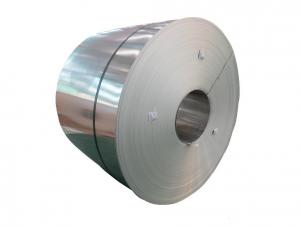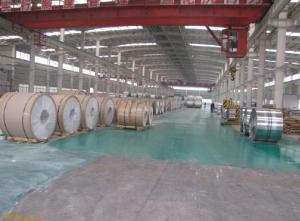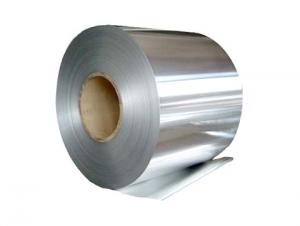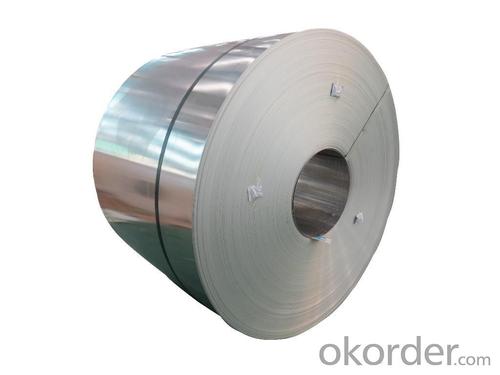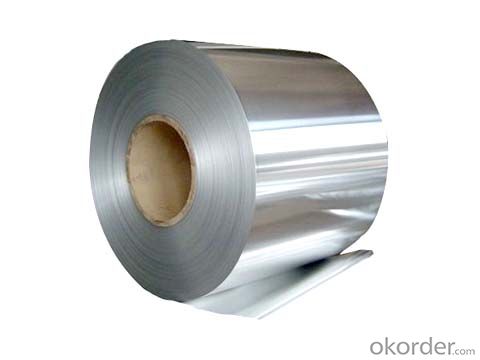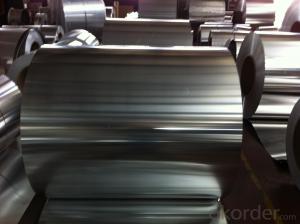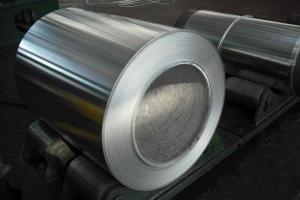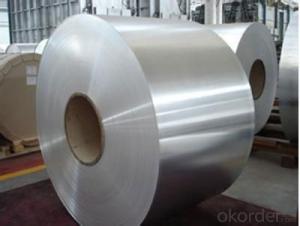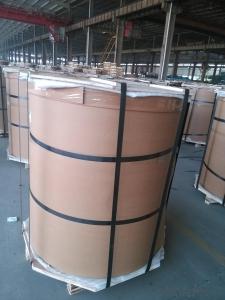Aluminum Coil - Continuous Casting Aluminium Coil AA1050 0.2mm-3mm
- Loading Port:
- China Main Port
- Payment Terms:
- TT or LC
- Min Order Qty:
- -
- Supply Capability:
- -
OKorder Service Pledge
OKorder Financial Service
You Might Also Like
1.Structure of Product Description
Continuous Casting Aluminium Coil is widly used in building materals in the world. This strip can be rolled down to aluminium coil,sheet,circle ect. Compare to other alloy, the alloy AA1050 is much more cheaper. Its weight is much lower than steel. So many customers choosed aluminium material instead of steel.
2. Main features of the product
a.Competitive price---We have our own mills and can produce mill finished aluminium coils, so we can control the production cost better.
b.Professional after-sale service---We have more than 15 years exportation experience and you need not worry about the exporation problems.
c.Fast delivery time---We can control the delivery time within 35 days.
3. Image
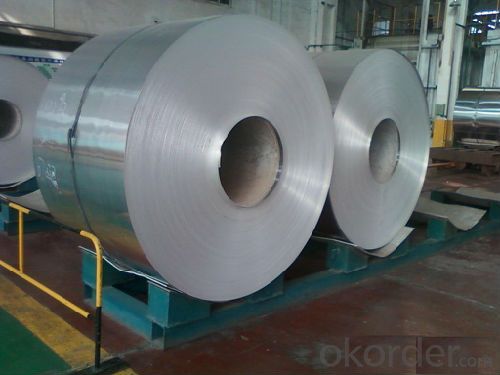
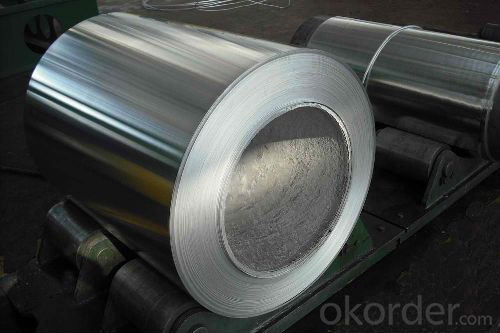
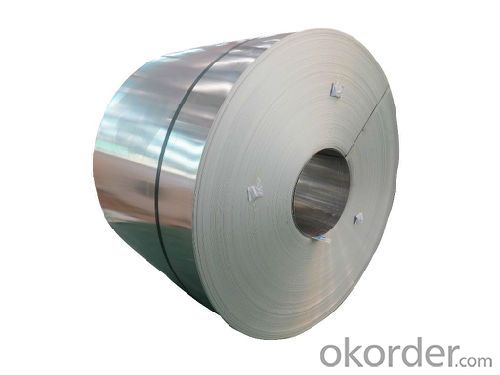
4. Products Specifcation
| Alloy | Temper | Thickness | Coil ID | Coil Weight |
| AA1050 | H14 | 0.2mm-3mm | 505mm | 2-2.5 tons |
5. FAQ
What is the quality standard?
---Usually our standard is GB3880-2006
What is the largest width?
---It is 2300mm
What is the MOQ?
---Usually we can accept 80 tons.
- Q: Can aluminum coils be used for gutter systems?
- Yes, aluminum coils can be used for gutter systems. Aluminum is a popular material for gutters due to its lightweight nature, durability, and resistance to rust and corrosion. Aluminum coils are often used to form seamless gutters, which offer advantages such as fewer leaks and a more aesthetically pleasing appearance. Additionally, aluminum gutters are easy to maintain and can be painted to match the exterior of a building. Overall, aluminum coils are a suitable and commonly used choice for gutter systems.
- Q: Are there any health risks associated with aluminum coils?
- There are some concerns about the potential health risks associated with aluminum coils. Aluminum is a common material used in the construction of coils for air conditioning and refrigeration systems. However, when aluminum comes into contact with certain acids, such as those found in some cooling agents and cleaning solutions, it can corrode and release aluminum ions into the air. Inhaling these aluminum ions may pose health risks, particularly for individuals with respiratory conditions or allergies. Additionally, there have been reports suggesting a potential link between aluminum exposure and certain health issues, such as Alzheimer's disease and breast cancer. However, scientific research regarding this connection is inconclusive and ongoing. It is important to note that aluminum is a naturally occurring element found in many foods, water, and even the air we breathe. It is also used in various consumer products, such as cookware and food packaging. To minimize potential health risks, it is recommended to ensure proper maintenance and cleaning of air conditioning and refrigeration systems to prevent the buildup of corrosive substances. Regularly changing air filters and using appropriate cleaning solutions can help reduce the risk of aluminum corrosion. Additionally, individuals with pre-existing respiratory conditions or allergies may consider consulting with a healthcare professional to determine any specific precautions they should take.
- Q: What is the typical width tolerance for aluminum coils?
- The typical width tolerance for aluminum coils can vary depending on the specific industry and application. However, in general, the width tolerance for aluminum coils is typically around ±0.005 to ±0.010 inches. This means that the actual width of the aluminum coil can vary within this range from the specified target width. It is important to note that these tolerances may be tighter or looser depending on the specific requirements of the customer or application. Additionally, it is common for aluminum coil manufacturers to provide different width tolerances for different grades or thicknesses of aluminum coils, so it is crucial to consult the manufacturer's specifications or guidelines for precise information on the width tolerance for a particular aluminum coil.
- Q: How are aluminum coils protected against mechanical damage?
- To safeguard aluminum coils from mechanical harm, multiple methods are employed. One of the primary techniques involves the application of a protective coating or finish to the coil's surface. This coating acts as a shield, preventing any potential sources of mechanical damage, such as impact or abrasion, from affecting the coil. The coating itself can either be a standard paint or a specialized aluminum coating, offering enhanced durability and resistance to scratching or denting. Apart from the protective coating, aluminum coils may also undergo reinforcement with an additional layer of laminate or film. This supplementary layer provides an extra level of defense against mechanical damage, effectively warding off dents or scratches. The application of the laminate or film can occur during the manufacturing process or as a separate step following coil production. Furthermore, to minimize the risk of mechanical damage during transportation or storage, aluminum coils can be wrapped or packaged in protective materials like plastic or foam. These wrappings serve to cushion the coil and create a barrier against potential impacts or heavy objects that could cause damage. In conclusion, a combination of protective coatings, laminates, and packaging materials ensures the adequate protection of aluminum coils from mechanical harm. These measures are instrumental in preserving the integrity and quality of the coils, enabling them to effectively fulfill diverse applications.
- Q: What is the typical tensile strength of aluminum coils?
- The typical tensile strength of aluminum coils can vary depending on the specific grade and temper of the aluminum being used. Generally, aluminum coils have a tensile strength ranging from 30,000 to 75,000 pounds per square inch (psi). However, it is important to note that this range can be narrower or wider depending on the intended application and the specific alloy being used. Additionally, factors such as the thickness and width of the coil may also impact the tensile strength.
- Q: This question asks for the most effective methods to clean an aluminum coil, which is a common component in various industries.
- <p>The best ways to clean aluminum coils involve a combination of mechanical and chemical processes. Mechanical cleaning can be done using brushes or pressure washing to remove loose dirt and debris. Chemical cleaning involves using a suitable aluminum cleaner or mild detergent solution to dissolve stubborn grime. Always rinse thoroughly with water to remove any residue. Avoid abrasive materials or harsh chemicals that could scratch the surface. Regular cleaning and maintenance can prevent buildup and extend the coil's lifespan.</p>
- Q: Can aluminum coils be used in automotive applications?
- Automotive applications can indeed utilize aluminum coils. Given their lightweight nature, aluminum coils prove to be an exceptional option for automotive manufacturers, aiding in the reduction of overall vehicle weight. Consequently, this reduction can lead to enhanced fuel efficiency and performance. In addition, the outstanding heat conductivity of aluminum coils becomes indispensable in automotive applications, particularly when it comes to heat dissipation. Furthermore, the commendable corrosion resistance of aluminum coils proves to be highly advantageous in automotive applications, specifically when vehicles are exposed to diverse weather conditions and road salts. All in all, the utilization of aluminum coils in automotive applications offers numerous benefits, including weight reduction, improved fuel efficiency, superior heat dissipation, and enhanced corrosion resistance.
- Q: What are the different alloys used in aluminum coils?
- There are several different alloys commonly used in aluminum coils, each with its own unique properties and applications. Some of the most frequently used alloys include: 1. 3003: This alloy is known for its excellent formability and corrosion resistance. It is often used in applications that require moderate strength, such as automotive parts, storage tanks, and kitchen utensils. 2. 5052: This alloy is highly versatile and offers good corrosion resistance, high fatigue strength, and excellent weldability. It is commonly used in the manufacturing of aircraft fuel tanks, marine components, and architectural applications. 3. 6061: Known for its high strength and excellent machinability, 6061 is often used in structural components, such as frames and braces. It also offers good corrosion resistance and is commonly used in the aerospace and automotive industries. 4. 8011: This alloy is primarily used in the packaging industry, especially for making aluminum foil. It offers good formability, high tensile strength, and excellent resistance to moisture and chemicals. 5. 1100: This is a commercially pure aluminum alloy, known for its high electrical conductivity and good thermal conductivity. It is commonly used in electrical wiring, heat exchangers, and lighting fixtures. These are just a few examples of the alloys used in aluminum coils, and there are many other variations available to suit specific needs and applications. The choice of alloy depends on factors such as desired strength, corrosion resistance, formability, and cost considerations.
- Q: i know that your not suppose to use DC for aluminum only with AC but is it possible?
- yes
- Q: What are the methods to prevent rust formation on aluminum coils during storage and transportation?
- <p>To prevent rust on aluminum coils during storage and transportation, ensure that the coils are clean and dry before storage. Store them in a cool, dry place away from moisture and corrosive substances. Use protective wrappings or coatings to shield the coils from the environment. Maintain proper ventilation to reduce humidity. Avoid stacking the coils directly on the ground; use pallets or racks to keep them off damp surfaces. Regularly inspect the coils for signs of moisture or damage and address any issues promptly.</p>
Send your message to us
Aluminum Coil - Continuous Casting Aluminium Coil AA1050 0.2mm-3mm
- Loading Port:
- China Main Port
- Payment Terms:
- TT or LC
- Min Order Qty:
- -
- Supply Capability:
- -
OKorder Service Pledge
OKorder Financial Service
Similar products
Hot products
Hot Searches
Related keywords
